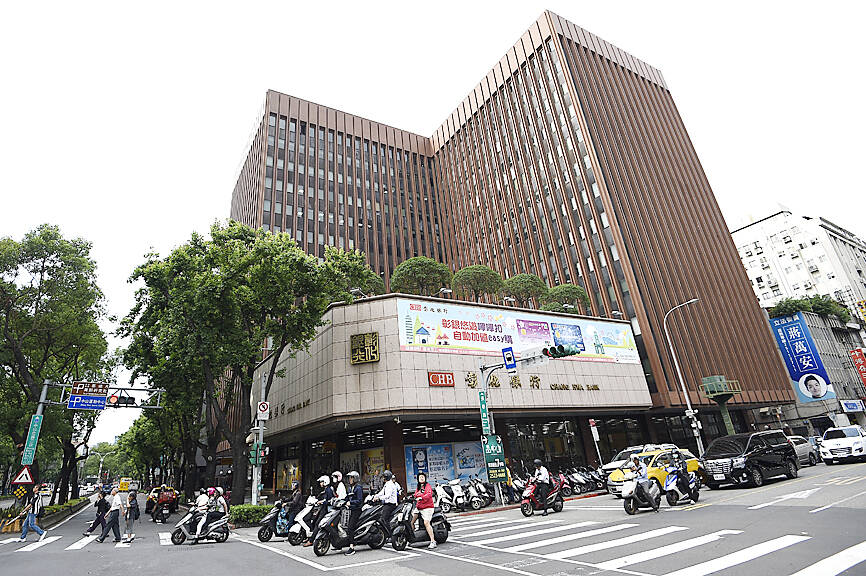State-run Chang Hwa Commercial Bank (CHB, 彰化銀行) said yesterday it is looking at stable profit growth this year on the back of improving loan demand, as exports and private investments come out of the woods after several quarters of inventory adjustments.
“We aim to increase outstanding loans by 3 to 5 percent this year, faster than last year’s 3.9 percent advance,” CHB spokeswoman Wang Shwu-fang (王淑芬) told an investors’ conference in Taipei.
Taiwanese firms would display more interest in capital spending and capacity expansion, as exports steadily emerge from technology product adjustments, Wang said.

Photo: Chen Chih-chu, Taipei Times
The lender reported that net income last year grew 18.33 percent year-on-year to NT$12.98 billion (US$406.95 million), or earnings per share of NT$1.2.
Net interest margin shed 2 basis points to 0.82 percent at the end of last year, as high borrowing costs curbed loan demand.
Taiwan’s interest rate remains quite low compared with that of the US, which is favorable for foreign exchange swaps, a major profit driver in recent years and hopefully in the first half of this year, Wang said.
CHB expects the US Federal Reserve to start cutting interest rates in June to avoid an economic hard landing, she said.
As for investments, the lender said it would raise its stake in US bonds in batches to expand fixed income, and increase holdings in stocks that pay generous cash dividends and support environmental protection and social responsibility.
While focusing on corporate banking, CHB is looking to gain market share in mortgage operations and land financing, it said.
Property development might slow slightly this year, but housing transactions would pick up, buoyed by first-home purchases to take advantage of the government’s interest subsidy, it said.
Developers are likely to slow new project launches and prioritize digesting unsold houses, as authorities have no intention of easing credit controls, CHB said, adding that it would still focus on urban renewal projects this year.
CHB is seeking to boost profit contributions from overseas to 30 percent this year, from 11 percent last year, Wang said.
Its branch in Hong Kong is expected to generate the largest pre-provision income, followed by branches in the US and Singapore, she said.
CHB on Monday opened a new branch in Japan and plans to set up new branches in Canada’s Toronto, Australia’s Sydney and in Southeast Asia, she added.

SELL-OFF: Investors expect tariff-driven volatility as the local boarse reopens today, while analysts say government support and solid fundamentals would steady sentiment Local investors are bracing for a sharp market downturn today as the nation’s financial markets resume trading following a two-day closure for national holidays before the weekend, with sentiment rattled by US President Donald Trump’s sweeping tariff announcement. Trump’s unveiling of new “reciprocal tariffs” on Wednesday triggered a sell-off in global markets, with the FTSE Taiwan Index Futures — a benchmark for Taiwanese equities traded in Singapore — tumbling 9.2 percent over the past two sessions. Meanwhile, the American depositary receipts (ADRs) of Taiwan Semiconductor Manufacturing Co (TSMC, 台積電), the most heavily weighted stock on the TAIEX, plunged 13.8 percent in

A wave of stop-loss selling and panic selling hit Taiwan's stock market at its opening today, with the weighted index plunging 2,086 points — a drop of more than 9.7 percent — marking the largest intraday point and percentage loss on record. The index bottomed out at 19,212.02, while futures were locked limit-down, with more than 1,000 stocks hitting their daily drop limit. Three heavyweight stocks — Taiwan Semiconductor Manufacturing Co (TSMC, 台積電), Hon Hai Precision Industry Co (Foxconn, 鴻海精密) and MediaTek (聯發科) — hit their limit-down prices as soon as the market opened, falling to NT$848 (US$25.54), NT$138.5 and NT$1,295 respectively. TSMC's

TARIFFS: The global ‘panic atmosphere remains strong,’ and foreign investors have continued to sell their holdings since the start of the year, the Ministry of Finance said The government yesterday authorized the activation of its NT$500 billion (US$15.15 billion) National Stabilization Fund (NSF) to prop up the local stock market after two days of sharp falls in reaction to US President Donald Trump’s new import tariffs. The Ministry of Finance said in a statement after the market close that the steering committee of the fund had been given the go-ahead to intervene in the market to bolster Taiwanese shares in a time of crisis. The fund has been authorized to use its assets “to carry out market stabilization tasks as appropriate to maintain the stability of Taiwan’s

In a small town in Paraguay, a showdown is brewing between traditional producers of yerba mate, a bitter herbal tea popular across South America, and miners of a shinier treasure: gold. A rush for the precious metal is pitting mate growers and indigenous groups against the expanding operations of small-scale miners who, until recently, were their neighbors, not nemeses. “They [the miners] have destroyed everything... The canals, springs, swamps,” said Vidal Britez, president of the Yerba Mate Producers’ Association of the town of Paso Yobai, about 210km east of capital Asuncion. “You can see the pollution from the dead fish.